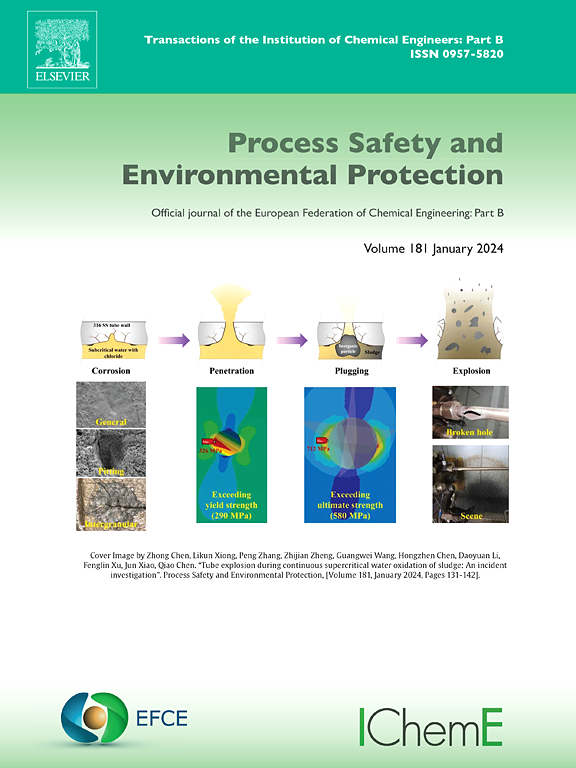竹生物炭和氨氧化细菌对绿化废弃物和鸡粪蚯蚓堆肥过程中氮转化和微生物动态的协同效应
IF 6.9
2区 环境科学与生态学
Q1 ENGINEERING, CHEMICAL
引用次数: 0
摘要
本研究旨在探讨竹生物炭或/和氨氧化细菌对绿色垃圾和鸡粪共同沤肥过程中氮转化和微生物动态因子的影响。结果表明,添加竹生物炭和微生物菌剂可提高有机物降解、腐殖质形成、腐殖酸-富味酸比率、碳氮比和发芽指数,从而显著改善蛭石堆肥的整体质量和成熟度。同时添加竹生物炭和蛭石堆肥后,氨的排放量大幅减少(67.96%),硝态氮(79.01%)和总氮(22.49%)的积累也显著增加。此外,同时添加竹生物炭和微生物制剂可提高氨化细菌亚硝化细菌和亚硝化单胞菌的水平,并提高氨单氧酶、羟胺氧化酶和硝酸盐氧化还原酶的活性。此外,联合添加还富集了参与有机物降解和磷转化的有益菌,如细胞弧菌、假单胞菌、野村菌、假黄单胞菌等,同时抑制了反硝化细菌。因此,本研究建议在绿化废弃物和鸡粪蛭石堆肥过程中,将竹生物炭和微生物菌剂共同添加,作为提高蛭石堆肥质量和抑制氮流失的有效方法。本文章由计算机程序翻译,如有差异,请以英文原文为准。
Synergistic effects of bamboo biochar and ammonia oxidizing bacteria on nitrogen transformation and microbial dynamics during vermicomposting of green waste and chicken manure
This study aims to explore the impact of bamboo biochar or/and ammonia-oxidizing bacteria on the nitrogen transformation and microbial dynamic factors during green waste and chicken manure co-vermicomposting. The results revealed that the addition of bamboo biochar combined with microbial agents significantly improved the overall quality and maturity of vermicompost by enhancing organic matter degradation, humus formation, humic-fulvic acid ratio, carbon-to-nitrogen ratios and germination index. The combined addition led to a substantial reduction in ammonia emissions (67.96 %) along with a notable increase in nitrate nitrogen (79.01 %) and total nitrogen (22.49 %) accumulation. Moreover, jointly adding bamboo biochar and microbial agents enriched the level of ammonifying bacteria Nitrosospira and Nitrosomonas and increased the activities of ammonia monooxygenase, hydroxylamine oxidase, and nitrate oxidoreductase. Furthermore, the combined addition enriched the beneficial bacteria, such as Cellvibrio, Pseudomonas, Nonomuraea, Pseudoxanthomonas, etc., which are involved in organic matter degradation and phosphorus transformation, while inhibiting denitrifying bacteria. Therefore, this study recommends the co-addition of bamboo biochar and microbial agents as an effective approach to improve vermicompost quality and inhibit nitrogen loss during green waste and chicken manure vermicomposting.
求助全文
通过发布文献求助,成功后即可免费获取论文全文。
去求助
来源期刊

Process Safety and Environmental Protection
环境科学-工程:化工
CiteScore
11.40
自引率
15.40%
发文量
929
审稿时长
8.0 months
期刊介绍:
The Process Safety and Environmental Protection (PSEP) journal is a leading international publication that focuses on the publication of high-quality, original research papers in the field of engineering, specifically those related to the safety of industrial processes and environmental protection. The journal encourages submissions that present new developments in safety and environmental aspects, particularly those that show how research findings can be applied in process engineering design and practice.
PSEP is particularly interested in research that brings fresh perspectives to established engineering principles, identifies unsolved problems, or suggests directions for future research. The journal also values contributions that push the boundaries of traditional engineering and welcomes multidisciplinary papers.
PSEP's articles are abstracted and indexed by a range of databases and services, which helps to ensure that the journal's research is accessible and recognized in the academic and professional communities. These databases include ANTE, Chemical Abstracts, Chemical Hazards in Industry, Current Contents, Elsevier Engineering Information database, Pascal Francis, Web of Science, Scopus, Engineering Information Database EnCompass LIT (Elsevier), and INSPEC. This wide coverage facilitates the dissemination of the journal's content to a global audience interested in process safety and environmental engineering.
 求助内容:
求助内容: 应助结果提醒方式:
应助结果提醒方式:


